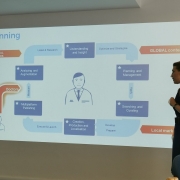Summary
The seminar in July received very positive feedback. The two speakers were able to present their different perspectives on this practical topic with expertise and they coordinated together like the perfect double act! The audience learnt from first hand experience how to work through the four stages of Content Strategy development, and then had a chance to question the speakers so that the presentation could be directly linked to current real life examples. There was a final syndicate session that gave all present the opportunity to try their skills in a potential problem situation. Several of the audience members commented that what they had learnt from the session was immediately applicable to their own work situations and therefore would be in use by Monday morning!
Rahel Baillie and Kate Kenyon explained the role of content strategy in an organisation, and gave an in-depth view of the processes and tools used to transform existing content and knowledge into a profitable business asset. They addressed the question: what exactly is content strategy? And how is it useful to knowledge management. The two presenters had a wealth of experience in this field, gained from working with clients such as Facebook, Tesco, eBay, Cancer Research, Barclaycard, and various government agencies such as the City of Vancouver and the UK’s Department of International Trade.
In the first part of the session, Kate and Rahel looked at what content strategy is, and what it isn’t. They explored how content strategy as a discipline relates to knowledge management within an organisation. They went into detail on how efforts are focused on adding business value through content, and they explained the tools and processes content strategists use during the discovery process.
The second part of the session prided an opportunity to put these tools and processes into effect in a practical session aimed at creating a content strategy. Using a group of independent knowledge management specialists as the “client”, groups used techniques such as needs analysis, a content audit and content engineering to try and create a winning strategy and roadmap.
Speakers
Rahel Baillie has a strong track record of delivering end-to-end content systems in the context of digital strategy projects, often in environments with complex content delivery requirements: the professional who delivers the hard truths and sometimes difficult prescriptions that help organisations leverage their content as a business asset. To achieve this means analysing business problems to see where content is preventing organisations from meeting their business goals, defining content offerings, and then developing systems that integrate various types of content in to a coherent strategy to optimise its production and delivery in a way that allows it to be used to meet the goals of the organisation. See her full profile here: linkedin.com/in/rahelannebailie
Kate Kenyon is a senior content strategist with 15 years of experience solving all the gnarly problems that come with large-scale digital content management. Originally trained as a journalist at the BBC in 2005, she moved from creating content into the much harder challenge of managing it, and has been working in this area ever since. She has worked across the full spectrum of content strategy from writing to governance. Kate has a particular interest in the more technical aspects of content strategy: modelling content into scalable structures, particularly for voice assistants and multiplatform, as well as API definition. Her work has allowed her to work with a wide range of clients including Facebook, eBay, Tesco, Expedia, HSBC, Cancer Research UK, JustGiving, eHarmony and Mumsnet.
Time and Venue
2pm on 25th July 2019, The British Dental Association, 64 Wimpole Street, London W1G 8YS
Pre Event Information
What exactly is content strategy? And how is it useful to knowledge management professionals? This seminar will clarify the role of content strategy in an organisation, and give an in-depth view of the processes and tools used to transform existing content and knowledge into a profitable business asset. Presenters will bring a wealth of experience, gained from working with clients such as Facebook, Tesco, eBay, Cancer Research, Barclaycard, and various government agencies such as the City of Vancouver and the UK’s Department of International Trade. In the first part of the session, Kate and Rahel will begin with a look at what content strategy is, and what it isn’t. They will explore how content strategy as a discipline relates to knowledge management within an organisation. They will go into detail on how efforts are focused on adding business value through content, and explain the tools and processes content strategists use during the discovery process. The second part of the session will be a chance to put these tools and processes into effect in a practical session aimed at creating a content strategy. Using a group of independent knowledge management specialists as the “client”, we will use techniques such as needs analysis, a content audit and content engineering to create a winning strategy and roadmap.
Seminar Objectives:
• To understand what is meant by content strategy
• To determine how useful it is to knowledge management professionals
• To begin to understand how to develop a content strategy
Slides
No slides available for this presentation
Tweets
#netikx99
Blog
See our blog report: Content strategy
Study Suggestions
None available

